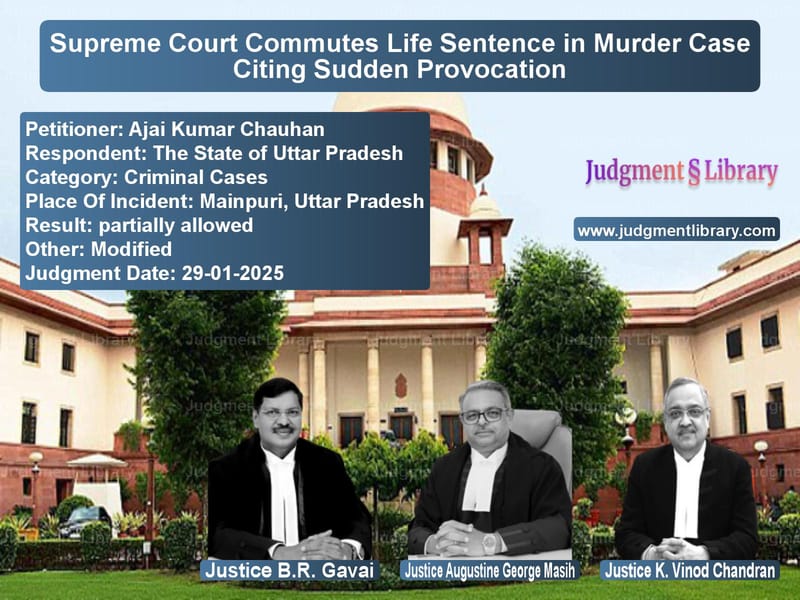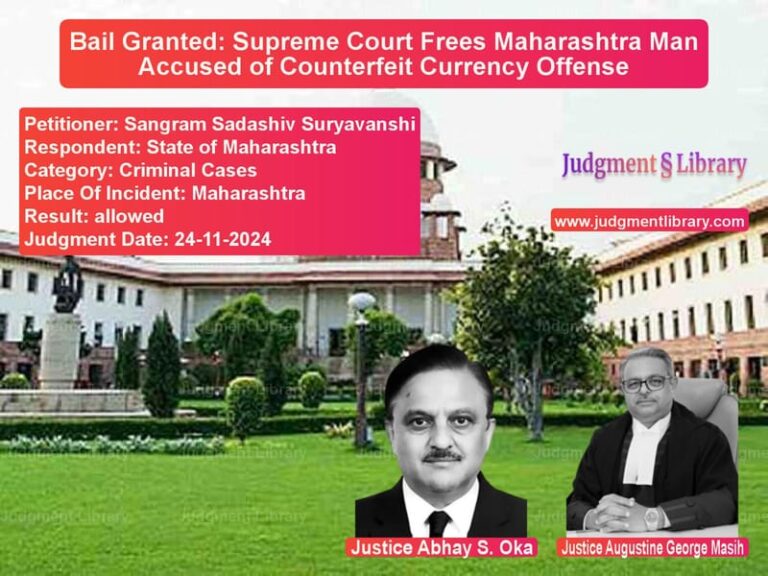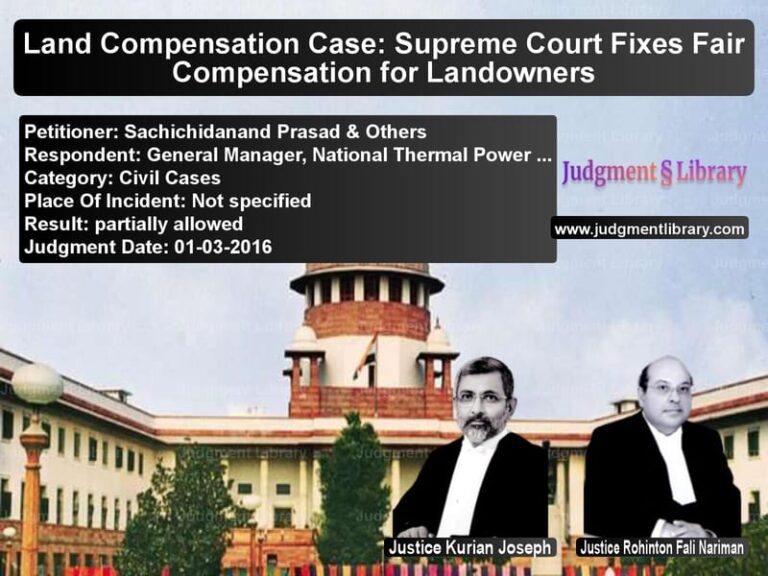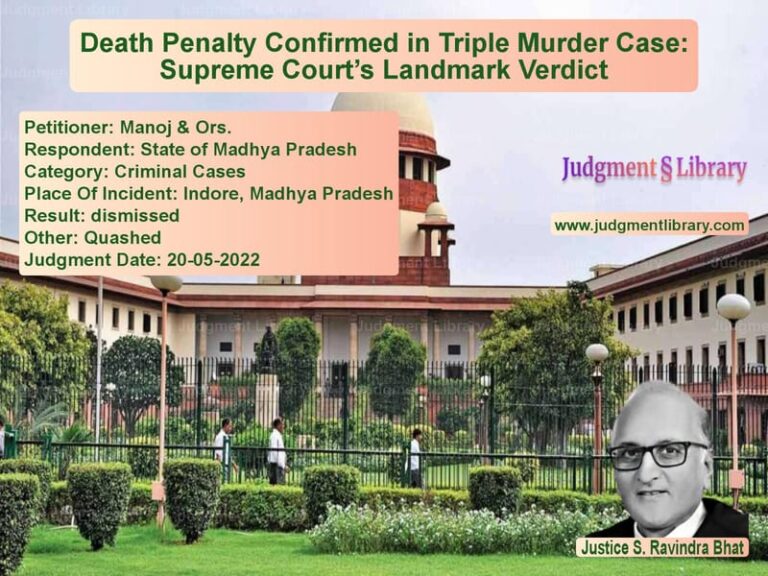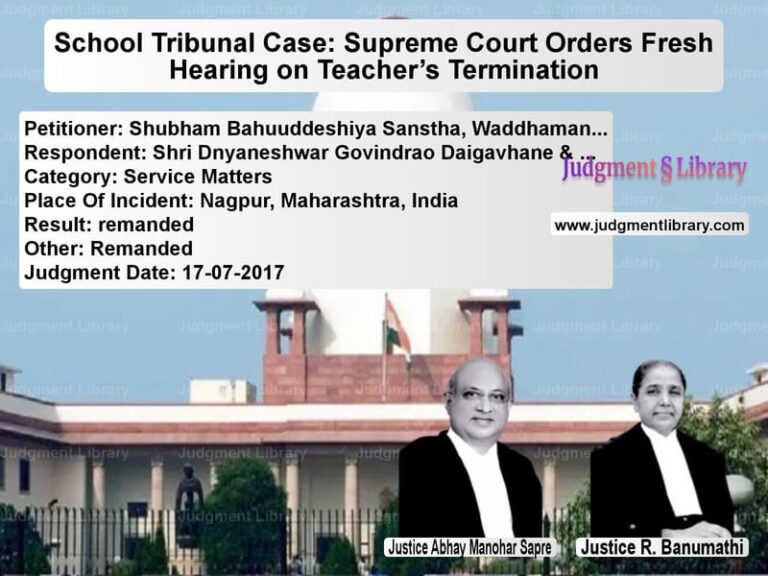Supreme Court Commutes Life Sentence in Murder Case Citing Sudden Provocation
The Supreme Court of India, in a significant judgment, commuted the life sentence of Ajai Kumar Chauhan to 10 years of rigorous imprisonment, ruling that the act was committed in the heat of the moment without premeditation. The Court applied Exception 4 of Section 300 IPC, which states that culpable homicide does not amount to murder if the act was committed in a sudden fight or due to provocation.
Background of the Case
The case dates back to March 19, 1985, in Mainpuri, Uttar Pradesh, where the appellant, Ajai Kumar Chauhan, was accused of murdering Rajeev, a B.Sc. student. The prosecution claimed that around 8:30 p.m., the accused called the deceased downstairs from the rooftop of his house and stabbed him with a knife. The deceased was initially treated at a local hospital and later shifted to S.N. Hospital, Agra, but succumbed to his injuries before reaching the facility.
The trial court found Ajai Kumar Chauhan guilty under Section 302 IPC and sentenced him to life imprisonment along with a fine of ₹5,000. The Allahabad High Court upheld the conviction and sentence in its judgment dated May 3, 2018. The appellant then approached the Supreme Court, arguing that the incident occurred in the heat of passion without premeditation.
Key Legal Issues
- Did the appellant act with premeditation, or was the act committed in the heat of passion due to sudden provocation?
- Was the case covered under Exception 4 of Section 300 IPC, which allows a reduction in punishment if the act was done in a sudden fight?
- Did the prosecution prove beyond a reasonable doubt that the appellant had a deliberate intention to kill?
Arguments by the Appellant (Ajai Kumar Chauhan)
- The appellant’s counsel contended that there was no prior enmity between the appellant and the deceased, and they were on friendly terms.
- He argued that there was no evidence of premeditation, and the altercation likely occurred spontaneously.
- The alleged motive—an altercation over a girl—was based on speculation and was not proven beyond a reasonable doubt.
- The prosecution’s reliance on witness statements was flawed, as none of them saw the exact moment the fight broke out.
Arguments by the Respondent (State of Uttar Pradesh)
- The prosecution argued that the appellant had deliberately called the deceased outside, indicating intent to harm.
- They pointed to the deceased’s last words—”Dada ana, mujhe mar dala” (Brother, come, he has killed me)—as proof that the attack was intentional.
- Eyewitnesses confirmed that the accused was seen stabbing the deceased.
- The prosecution insisted that even if there was no prolonged planning, the appellant’s use of a knife showed intent to kill.
Supreme Court’s Observations
- “From the evidence, it is difficult to conclude that the appellant had come with a premeditated intention to kill the deceased.”
- “The possibility of an altercation taking place between the appellant and the deceased for some reason and the appellant assaulting the deceased in the heat of passion on account of a sudden fight cannot be ruled out.”
- “The evidence suggests that both the appellant and the deceased were students and had friendly relations, which makes the argument of premeditation weaker.”
- “Given the circumstances, the case falls within Exception 4 of Section 300 IPC, which states that culpable homicide is not murder if it is committed without premeditation in a sudden fight in the heat of passion.”
Application of Legal Principles
- The Court considered precedent cases where sudden altercations led to unplanned killings, and the punishment was reduced accordingly.
- The ruling emphasized that a criminal conviction must be based on conclusive proof of intent, not speculation.
- It reaffirmed that judicial sentencing must balance the severity of the crime with the circumstances in which it occurred.
Final Judgment
- The Supreme Court altered the conviction from Section 302 IPC (murder) to Section 304 Part-I IPC (culpable homicide not amounting to murder).
- The appellant’s sentence was reduced to 10 years of rigorous imprisonment.
- Since the appellant had already served over eight and a half years in jail, including remission, the Court directed his immediate release unless required in another case.
Conclusion
The Supreme Court’s judgment highlights the importance of analyzing the circumstances leading to an offense before determining the severity of the punishment. By commuting the sentence, the Court acknowledged the absence of premeditation and applied legal principles that distinguish between murder and culpable homicide. This ruling sets a precedent for future cases where sudden altercations lead to fatal consequences.
Petitioner Name: Ajai Kumar Chauhan.Respondent Name: The State of Uttar Pradesh.Judgment By: Justice B.R. Gavai, Justice Augustine George Masih, Justice K. Vinod Chandran.Place Of Incident: Mainpuri, Uttar Pradesh.Judgment Date: 29-01-2025.
Don’t miss out on the full details! Download the complete judgment in PDF format below and gain valuable insights instantly!
Download Judgment: ajai-kumar-chauhan-vs-the-state-of-uttar-p-supreme-court-of-india-judgment-dated-29-01-2025.pdf
Directly Download Judgment: Directly download this Judgment
See all petitions in Murder Cases
See all petitions in Bail and Anticipatory Bail
See all petitions in Judgment by B R Gavai
See all petitions in Judgment by Augustine George Masih
See all petitions in Judgment by K. Vinod Chandran
See all petitions in partially allowed
See all petitions in Modified
See all petitions in supreme court of India judgments January 2025
See all petitions in 2025 judgments
See all posts in Criminal Cases Category
See all allowed petitions in Criminal Cases Category
See all Dismissed petitions in Criminal Cases Category
See all partially allowed petitions in Criminal Cases Category

